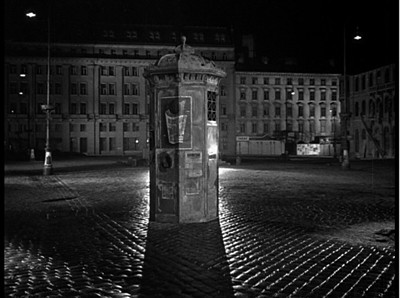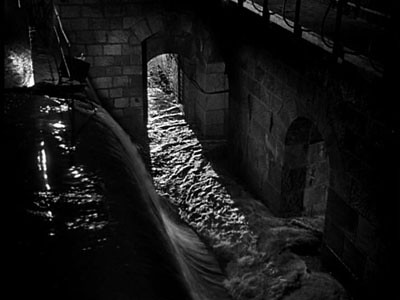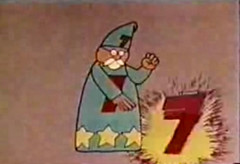It is not at all times that one can gain admittance into this edifice,
although most persons enter it at some period or other of their lives—if not in their waking moments, then by the universal passport of a dream. (Hawthorne, “The Hall of Fantasy”)


A kiosk in the center of a plaza in the zone of post-war Vienna under British control conceals a stone spiral staircase that descends into the sewers that connect the city’s five occupation zones, and it is into this network that Harry Lime, the villain of Carol Reed’s The Third Man, escapes. The channels and pools and waterfalls of the sewers, the round, brick tunnels through which the detectives splash, make up a dreamwork of fantasy chambers like the dark cellars of recurring dreams in which the compartments are reordered like the chutes of a marble run or the 2-D culverts of a video game, dragged from a set of subterranean architectural elements represented in a box in the corner and placed end to end to build the pipeline through which your agent crosses the screen, or like the basements of old New England houses, whose dirt floors and crumbling walls’ recesses and staircases’ secret cabinets gave sensible content to what you, as a 5th grader, might have imagined the Underground Railroad to be. The space where spaces connect is visited often in the movies; the sewers in the Zone in Stalker, the subways of Dark City and The French Connection, the casinos and hotels of Dr. Mabuse the Gambler, the courtyard in Rear Window, and, more recently, the hallways in Inland Empire and the Turkish bathhouse in Eastern Promises are renderings of this original space, cinematic arguments that the forms of our deep and basic orientation in space are architectural, and more narrative than geometrical in their arrangement. There’s a nifty sequence in Wes Anderson's The Life Aquatic with Steve Zissou that takes you through a cut-away mock-up of Zissou’s ship, where the rooms are laid out with the cartoon clarity of a cross-section from a Richard Scarry picture book, flat like an antfarm window, and here space is neat and cute like Ed Norton's IKEA catalog apartment in Fight Club, organized according to the demands of a stunted, solipcistic aesthethism that dignifies as perfectionism a desperate and autistic adherence to the safe success of kitsch, the sort of success whose failure The Life Aquatic powerfully critiques and then less powerfully redeems, and this cutaway view is recalled and amplified and made transcendent in a sequence at the end of The Darjeeling Limited, maybe the only fantastical part of the movie, where we see into a succession of train cars as the train passes—and am I correct in remembering that the camera shows them to be not just chained together but joined at right angles?—each a perfectly composed tableau with one of the characters we’ve met or heard about, who, though in some cases continents apart, are linked for a moment in the space of moving pictures.


A kiosk in the center of a plaza in the zone of post-war Vienna under British control conceals a stone spiral staircase that descends into the sewers that connect the city’s five occupation zones, and it is into this network that Harry Lime, the villain of Carol Reed’s The Third Man, escapes. The channels and pools and waterfalls of the sewers, the round, brick tunnels through which the detectives splash, make up a dreamwork of fantasy chambers like the dark cellars of recurring dreams in which the compartments are reordered like the chutes of a marble run or the 2-D culverts of a video game, dragged from a set of subterranean architectural elements represented in a box in the corner and placed end to end to build the pipeline through which your agent crosses the screen, or like the basements of old New England houses, whose dirt floors and crumbling walls’ recesses and staircases’ secret cabinets gave sensible content to what you, as a 5th grader, might have imagined the Underground Railroad to be. The space where spaces connect is visited often in the movies; the sewers in the Zone in Stalker, the subways of Dark City and The French Connection, the casinos and hotels of Dr. Mabuse the Gambler, the courtyard in Rear Window, and, more recently, the hallways in Inland Empire and the Turkish bathhouse in Eastern Promises are renderings of this original space, cinematic arguments that the forms of our deep and basic orientation in space are architectural, and more narrative than geometrical in their arrangement. There’s a nifty sequence in Wes Anderson's The Life Aquatic with Steve Zissou that takes you through a cut-away mock-up of Zissou’s ship, where the rooms are laid out with the cartoon clarity of a cross-section from a Richard Scarry picture book, flat like an antfarm window, and here space is neat and cute like Ed Norton's IKEA catalog apartment in Fight Club, organized according to the demands of a stunted, solipcistic aesthethism that dignifies as perfectionism a desperate and autistic adherence to the safe success of kitsch, the sort of success whose failure The Life Aquatic powerfully critiques and then less powerfully redeems, and this cutaway view is recalled and amplified and made transcendent in a sequence at the end of The Darjeeling Limited, maybe the only fantastical part of the movie, where we see into a succession of train cars as the train passes—and am I correct in remembering that the camera shows them to be not just chained together but joined at right angles?—each a perfectly composed tableau with one of the characters we’ve met or heard about, who, though in some cases continents apart, are linked for a moment in the space of moving pictures.


4 Comments:
the courtyard in Rear Window
;).
Whatevah happened to.......you know.......Kant? Not so much the synthetic a priori, categories, etc. (which I think works if and only if given cognitive reading, or you doin' theistosophy), but the ethics: could the humble Imperative Categorical ever be retrofitted, at least so that bloggers could like invoke it on occasion, and send those who ignore their ImpCat duty (think about your acts as binding on all, in reduced form) to ...very bad places..........
This entry is about forms of spacial experience. I do sometimes think about what it is to be a reasoning being, what sorts of things might occur to reasoning beings simply because they use reason, in what way reason might be binding, etc., but not really in my capacity as keeper of this page, where I am more concerned with things like forts, mossy stone walls, brackish wells, portcullises and drawbridges, bell towers, turrets from which one might look into the courtyard or out into the hills beyond, where, in some composition of trees and sky, the words "transcendental idealism" might appear as a rainbow, just a cartoon word coming out of the fat sleepy cat's mouth, a mildly allusive bubble cluster without a thesis, some neon silhouette of yourself you might imagine while you're listening to headphones. Sorry
A Rhineland of the mind! Ye olde Ruined Castle-Meme. We were re-reading some Macbeth recently; well, to be honest, reading reviews of Polanski's production of Macbeth. It's a must see for all gothy sorts, whether authentic or pop. Topless Weird sisters too. And Finch as Thane Macbeth nearly the ding-an-sich itself. The stony Castles themselves characters: enclosed, safe, the bloody kingdom within the warrior's kingdom. Thane Macbeth's synthetic a priori doesn't even kick in until late, after killing the king, his former cronies, his wifey's madness, etc. Everyman as Al Capone ....
Ruined castle perhaps more sublime: order to disorder, entropic, obviously. Cathedrals too offer good goth vibe, tho' that's bit different than the fortresses and castles. The crypts with the nobles, dukes, kings in the floors of the German/French cathedrals will give about anyone a fright. Poe knew about the secrets of castles and fortresses.
The Antwerp and Bruges area also sublime: turrets, beautiful stone facades, tight alleys, winding cobblestone. Bad german jazz, cheap food and beers and those weirdly beautiful horsey dutch gals who speak 4 or 5 languages. You expect to see gargoyles fly across the altstadt at dusk.
I was wandering in the museum a couple weeks ago and I found myself in front of a painting I knew from the cover of my copy of Burke's Philosophical Enquiry, Visitor to a Moonlit Churchyard. My master text on cathedrals is The Seven Lamps of Architecture. Poe castles: Hop-frog swinging from the candelabrum. I'll look for the Polanski movie--I've been thinking a lot about Shakespeare movies but not actually watching any.
Post a Comment
<< Home